Pipeline Battles: The Fight for South Stream
Dear Readers,
A decade after the American invasion, Iraq is as fragile, bloody and unforgiving as ever.
As I mentioned in many letters over the past year, the battle for control over energy and its corridors will continue to get worse. Tensions in the Middle East will grow as Russia makes further advances in attempts to gain further control of the energy flow in the Eastern Hemisphere, forcing the West into taking questionable actions.
I write on this subject with a heavy heart. The pictures and videos I have seen on the violence surrounding the major energy corridors are too gruesome to show.
Award-winning journalist Chris Floyd said it best:
“…Line up the bodies of the children, the thousands of children – the infants, the toddlers, the schoolkids – whose bodies were torn to pieces, burned alive or riddled with bullets during the American invasion and occupation of Iraq. Line them up in the desert sand, walk past them, mile after mile, all those twisted corpses, those scraps of torn flesh and seeping viscera, those blank faces, those staring eyes fixed forever on nothingness. This is the reality of what happened in Iraq; there is no other reality…” – Chris Floyd, December 17, 2011
I am not here to talk about what’s right or wrong; that’s not my job.
My job is to analyze world events that could impact our portfolio and our lives.
Unfortunately, too often in my research I find evidence of wrongdoing that makes me question every facet of the markets: Should high frequency trading be allowed? Should currency be backed by real assets? Should the United States have invaded Iraq?
You can share your answers by CLICKING HERE
As I write this, Obama is considering air strikes in Iraq and Syria, while extremists behead their opposition as they record it for the world to see…
I could post pictures of these heinous crimes but they are not only far too sickening to show, but its exactly what these evil-doers want.
If you want to see them, a simple Google search will do. I won’t take part in its distribution.
Expect Higher Oil Prices
Oil prices have now reached their highest level for the year, just as I said they would.
For now, Iraq’s situation has limited impact on oil since the advances of the extremist group have occurred in the northern area, while most of Iraq’s production – which recently hit a 30-year-high – has occurred in the south, with exports coming from terminals near Basra.
However, combine that with the uncertainty in the region including Russia’s annexation of Crimea, Libya’s instability, and the dramatic shift in political control and oil prices may rise even further.
This will eventually lead to a rise in gasoline prices, which will put a major damper on America’s recovering economy. Whether or not this will show in the stock market soon remains to be seen.
Regaining Control
Obama has plans to bring the United States back to prosperity via LNG exports to Europe and its renewed oil and gas boom*.
(*As I mentioned last week, the oil boom in American may not be as booming as everyone thought. According to the EIA, two-thirds of America’s reserves aren’t recoverable.)
This is why the control over the energy corridors that connect Russia to Europe are so important.
In terms of price, LNG shipments from the United States to Europe simply cannot compete with pipeline gas from Russia.
If the West can gain control of these corridors, it can regulate the price of gas flow from Russia. If it can somehow force Russia to increase its costs of exporting gas, then the American shale/fracking revolution and LNG will become closer to reality.
But how can the U.S. accomplish this?
Pump the Blood
Russia’s Gazprom – the world’s largest natural gas company, and majority owned by the Kremlin himself – is the heart of Russia.
Russia’s gas pipelines are the blood vessels, and the gas that flows through them is the blood.
Without the expansion of natural gas exports to fund Russia’s central budget, the nation would die
In order for Russia to survive, it must pump blood.
A Balance of Powers
Over the past year, I told you that a gas deal between China and Russia would likely happen and when it does, it could change the world.
A few weeks ago, a deal was struck by the two Eastern nations.
However, the deal was one that was signed to show power in unity against the West.
While significant, both nations have yet to determine the essential elements of pricing and volume, the terms of payments, and the overall determination of how the oil exported to China will be priced (i.e. what basket of oil products will be used to determine price.)
So while the deal looks strong in the eyes of world politics, it’s not yet enough to actually shift global powers from the West to the East.
Nor does it put Russia in a significantly better position.
Why?
If you’re trying to sell something, you want the highest price possible.
People often make the mistake of thinking price is set by the sell-side; it’s not – you can only sell something to someone if they want to buy it.
China may have struck a deal with Russia to buy gas from them, but the deal can only proceed if China agrees to the price.
If the price is too high, China may decide to buy less.
Simply put, the deal means very little unless it leads to a major increase in overall exports for Russia.
In order for Russia Gazprom Vladimir Putin to receive the best price for his gas, and his gas to China, he needs to maintain control of his market position where the majority of his gas exports are already going: Europe.
This will set the tone for world gas prices.
Pipeline Battles
As I mentioned in my previous letters, the battle for Ukraine and Syria are about important energy corridors in the Eastern Hemisphere.
If you haven’t read these letters, I suggest you do so first by going here:
The West wants control of certain regions in order to build pipelines that are beneficial to its regime – the Nabucco pipeline, for example – in order to diversify the natural gas suppliers and delivery routes for Europe; thus reducing European dependence on Russian energy.
The Nabucco pipeline has since been scrapped in favour of the Trans Adriatic Pipeline that runs from the Caspian Sea (Azerbaijan), starting from Greece via Albania and the Adriatic Sea to Italy and further to Western Europe.
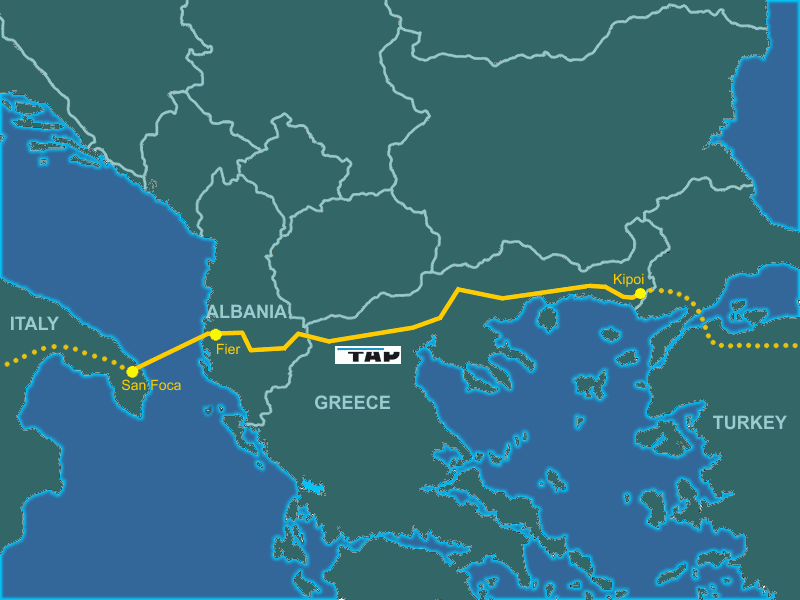
This is the pipeline of the West and could be used to lessen the dependence of Russian supplies.
Russia, of course, wants further control of the gas that flows through Europe. By gaining control, it will not only become more influential on European nations, but it will – as I mentioned earlier – give it control over its market position in Europe; thus stronger bargaining power with China.
If Russia gains control, global powers could indeed shift from the West to East, or at least find balance in between.
The Putin Plan
Putin’s plan is an extremely expensive pipeline build called the South Stream (more than double the cost of the scrapped Nabucco pipeline project) that runs from Beregovaya on Russia’s Black Sea coast through to Burgas in Bulgaria, and then further to Greece, Italy and Austria.
Why Would Russia Need Additional Pipelines if it Already Maintains Control of Europe’s Gas?
As I mentioned in my letter, the Real Reason for war in Ukraine, almost half of the gas Russia sells to Europe runs through pipelines in Ukraine.
That means Russia needs Ukraine’s cooperation in order to continue delivering gas to the European market.
But Ukraine is under the direct influence of western nations.
The South Stream pipeline – which is expected to be completed in 2015 and started two years ago – will allow Russia to completely bypass a Western-controlled Ukraine; thus giving Russia a tremendous position in Europe and allow Russia to dictate the price of gas, while easily undercutting America’s LNG exports to Europe.
If Ukraine ceased to be a transit route for gas to Europe, Ukraine would simply become a consumer of Russian gas supplies and no longer enjoy the bargaining power over gas prices it currently has. The completion of this pipeline would push Ukraine into a deeper economic crisis as Russia raises the price of gas it sells to Ukraine – or completely cut Ukraine off*.
(*Ukraine began preparing on Friday for Russia to cut off its gas after talks on long-running price dispute broke down. Gazprom has also told Ukraine it has until this Monday to pay $1.95 billion dollars in gas debts, or gas will be cut off.)
When it’s all said and done, the completion of the South Stream pipeline would eventually force Ukraine into Russian control.
More importantly, it would put a dagger in the natural gas export aspirations of the U.S.
The Power of the West
If you think the West has been sitting idle as Russia continues its energy dominance, think again.
Under major pressures from the U.S. and the EU, the South Stream pipeline has now been put on hold after Bulgaria’s announcement that it will suspend the process of awarding tenders for the project.
Via WSJ:
“The Bulgarian government said it suspended construction of the Russian-backed South Stream natural-gas pipeline through its territory at the request of European Union officials, who wanted to investigate the way the contracts were awarded.
At issue are concerns that the manner in which Bulgaria undertook the project could violate European competition laws and also involve dealings with Russian individuals who were hit with sanctions by the U.S. after Russia annexed Crimea from Ukraine.
On June 3, the European Commission, the EU’s executive, demanded that Sofia halt construction of the pipeline so competition authorities can investigate.
“I ordered a stop to the construction,” Prime Minister Plamen Oresharski said late Sunday. “Depending on consultations with Brussels we’ll decide the course of further work.”
Mr. Oresharski met with several U.S. senators in Sofia over the weekend, including Sen. John McCain, (R., Ariz.).
According to the Bulgarian government’s statement, Mr. McCain said that he would like to see less Russian involvement in any future development of South Stream.”
Western influence has been forcing Bulgaria to reconsider its business relations with Russian firms.
For example, Washington has already warned Bulgaria that if it chooses Russian pipeline construction firm Strojtransgaz to build the South Stream pipeline – controlled by Washington sanctioned Gennady Timchenko – then Bulgarian companies participating in the consortium might also be sanctioned.
This isn’t the first time the West has tried to stop the pipeline project.
The EU has been relentlessly pressing Bulgaria to stop cooperation on the project because of its current dispute with Russia over Gazprom’s monopoly-like business practices.
Brussels – the centre of the EU and NATO – accuses Gazprom of monopoly-like practices and says that it has to follow the rules of the European Commission’s Third Energy Package.
In short, the Third Energy Package (TEP), which came into effect in 2009, was created to prevent foreign nations from having control of the pipelines in Europe.
In other words, it was to prevent Russia from both owning and operating the pipelines.
Gazprom holds a 50 percent stake in the Bulgarian portion of the South Stream project.
Via political maneuvering, the EU states that intergovernmental agreements signed for the South Stream pipeline are incompatible with the Third Energy Package (created by the West) – even if many of these contracts for the South Stream project were created before TEP was implemented.
That’s why Russia is now suing the EU over TEP with the World Trade Organization, stating that the TEP and other documents “should not be backdated to the contracts that were signed before the decision on the Third Energy Package came into force.”
Bulgaria is now being used as ammunition against Russia by the West, using laws recently created by the West.
While Bulgaria has ceased operations for now, it has told the European Commission that it would seek compensation through courts if they were forced to give up the pipeline project – a project that Bulgaria has already invested several billion dollars into.
However, Bulgaria is the EU’s poorest state, which means it will likely have to follow the orders of the European Commission.
It’s no wonder that just hours after Bulgaria Prime Minister’s announcement on halting the South Stream project, that Socialist Party and its junior coalition partner said they were ending cooperation.
Shortly after, head of the Bulgaria’s Socialist Party, Sergei Stanishev, announced that the government would step down in the next several days and called for new elections as early as July.
This does not look good for Russia.
With a new potential government in place, the South Stream project may cease altogether – or be delayed significantly; thus giving more time for the West to secure better position.
If South Stream continues at the Bulgarian checkpoint, I am sure the West will attempt to maintain at least the other 50% control of the project.
The heads of state and government of the European Union’s 28 member states have already planned a summit to discuss the situation around the implementation of the South Stream project in the next two weeks.
Do you think TEP is fair? Will Russia win in suing the EU?
CLICK HERE to share your thoughts.
Further Roadblocks for Russia
While Bulgaria currently represents the biggest hurdle for the South Stream pipeline, Russia still has to deal with two other countries in attempts to connect its gas to Europe.
If you look at the map, you can see that South Stream requires offshore water zone access through the Black Sea.
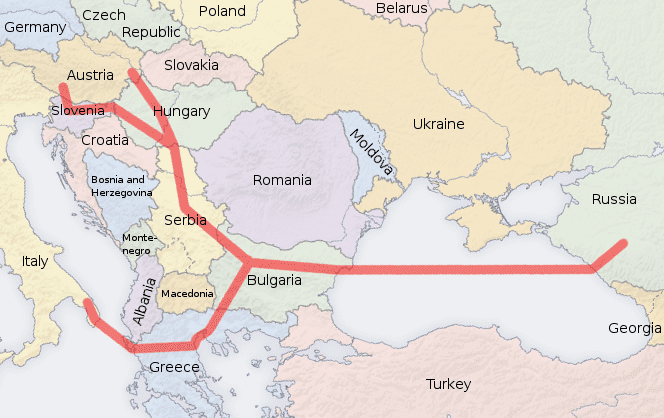
With the annexation of Crimea, Russia no longer has to worry about Ukrainian offshore Black Sea permissions for the underwater portion of South Stream.
But it does have to worry about Romania and Turkey.
Romania is a member of the EU and NATO. Turkey is a member of NATO.
That means both countries are under the direct influence of the West.
For Russia, this – along with Bulgaria – represents major roadblocks to the South Stream project.
The 2015 completion time for the South Stream project will likely be postponed.
As a result, Russia’s bargaining chips with China will diminish, as will Gazprom’s bottom line.
Regardless of the outcome, don’t expect oil prices to fall, but do expect tensions to worsen.
Base Metals Update
Last week, I told you the price of base metals would continue to decline as a result of the further unwinding of supplies related to commodities financing deals.
This week, iron ore prices tumbled to 21-month lows.
I stress that base metals are not looking good. That means neither are the miners that produce them.
The Equedia Letter






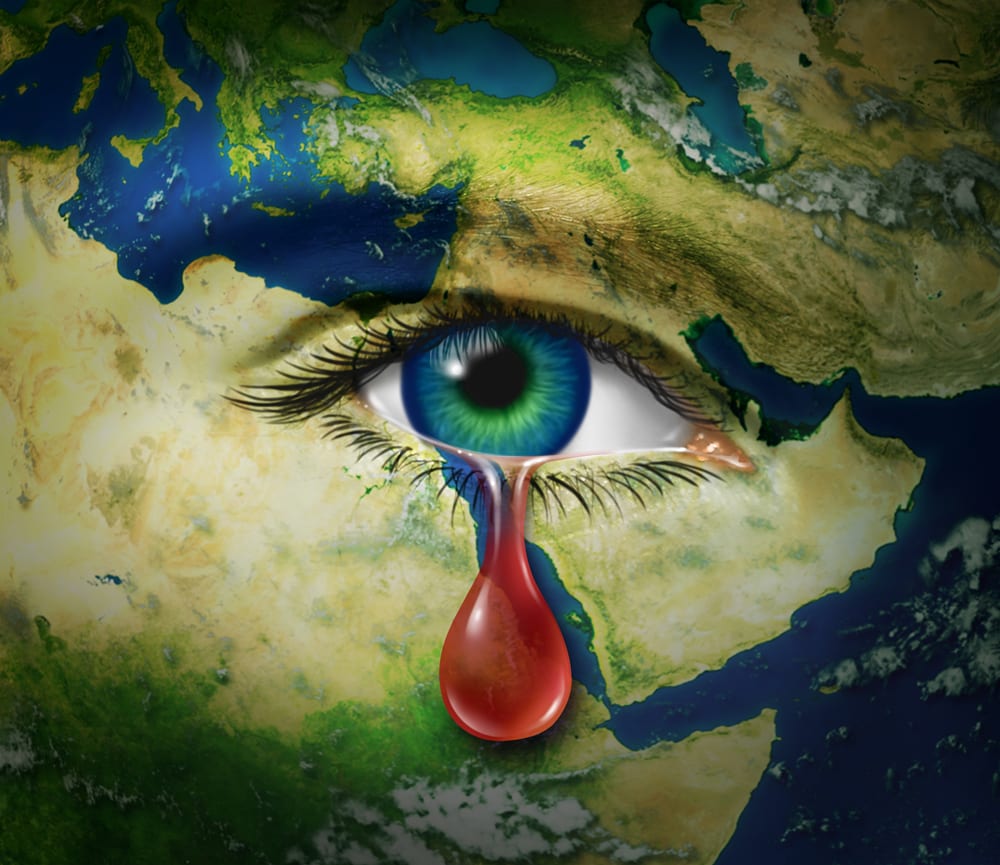

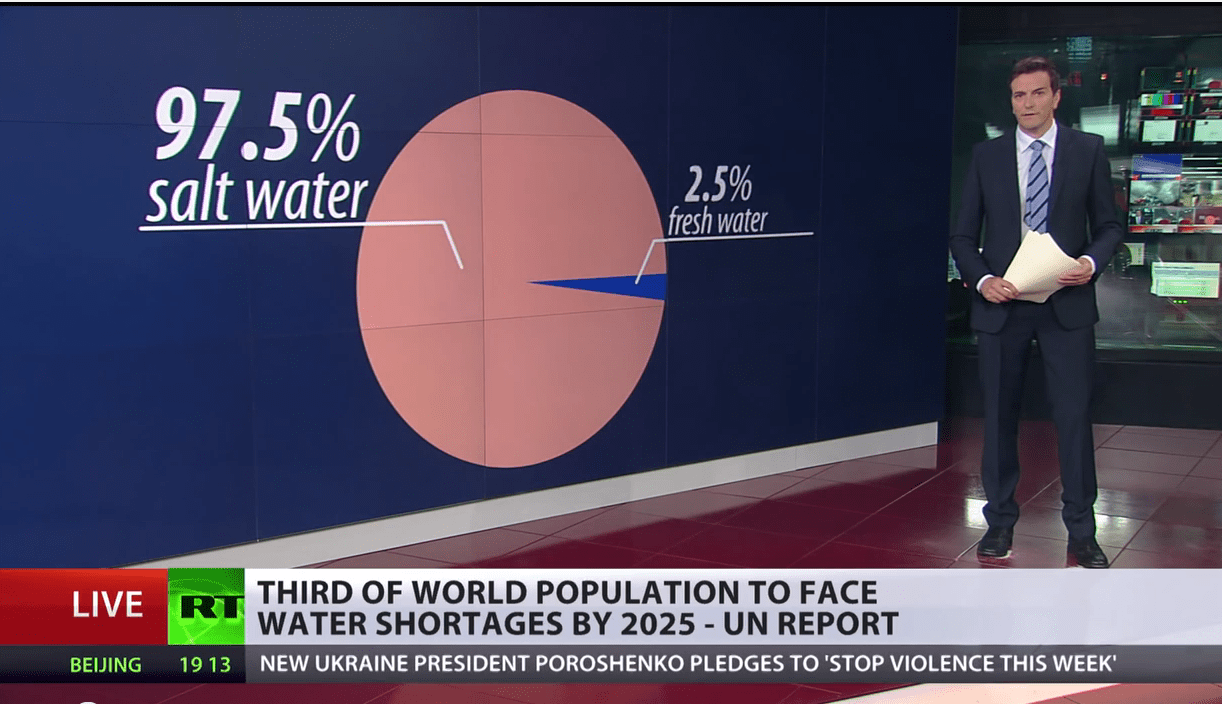
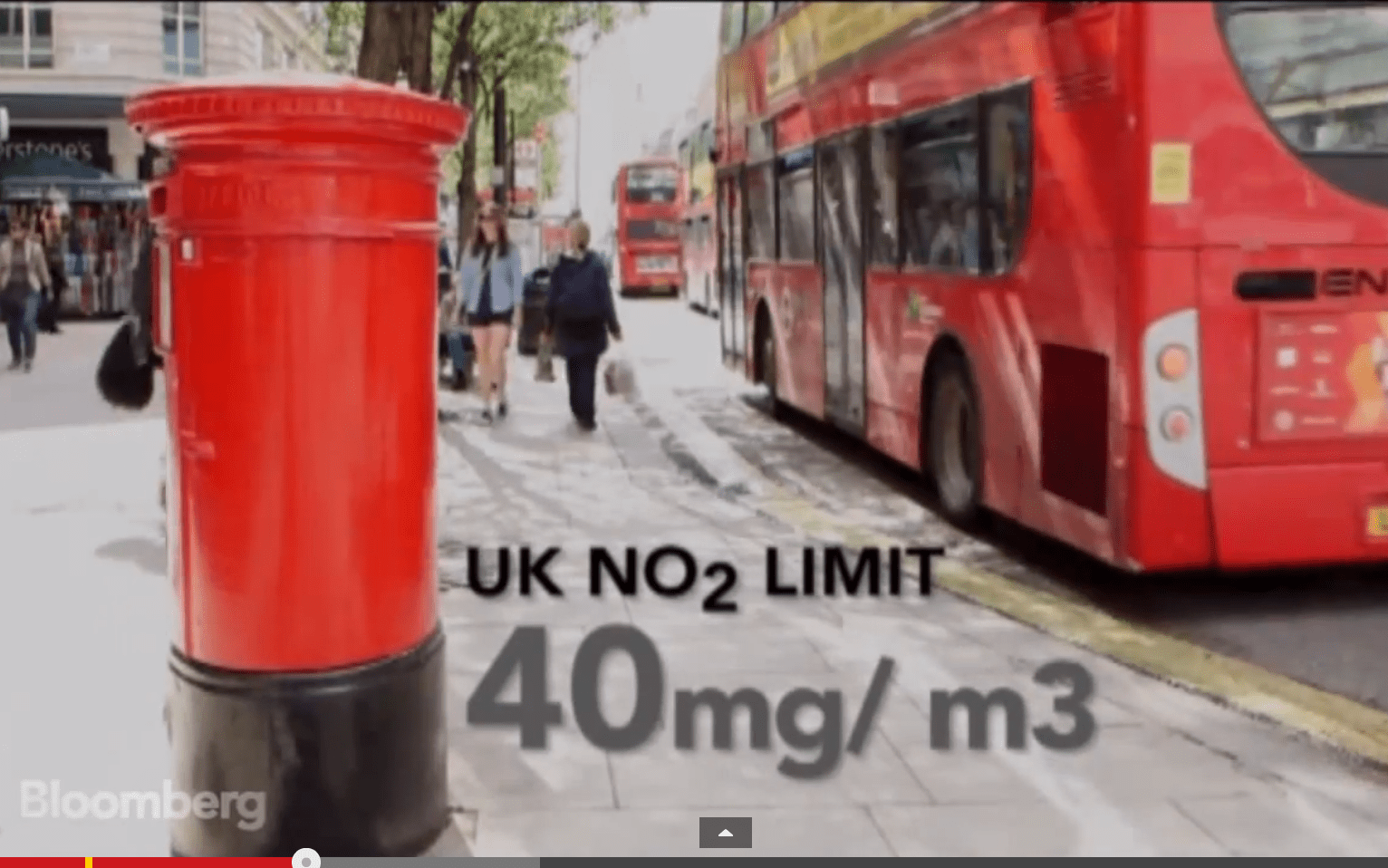




Saddam was doing a good job. the us remouved him and mow there is a unmanagable situation for the us. they should have negociated with sadam instead of showing strong arm
1. High frequency trading should not be allowed. It makes money for the haves at the expense of havenots.
2. yes currency should be backed by hard assets or its just worthless paper.
3. U.S should NOT have attacked IRAQ. It went in for the wrong baseless reason. It left the region in a mess, displaced people and uncountable innocent people got killed while the world looked on. Saddam kept the country together. Now we witness wrong people wanting to take over the country paving way for more of the same atrocities. Sad indeed.
Is the Cold War warming up? Who is taking the lead to get the East and the West to compromise and make this world a better place. Watching it from side lines is not a solution. Getting parties at the table may be a better choice.
I’ve generally enjoyed some of you information but you are getting silly lately. Russia is the problem? really?!?! cheezus! what a load of contradicting waffle… although you can’t help skirting often with the truth and hideous, blood soaked hypocrisy of the “west£… best make that the desperate jewboy/anglo/american mafia and neo-con NATO warmongers whose REAL economies are so fracked up their criminal insanity is going off the charts….
rhe world would be in a lot better position if the u.s. would just stay out of other nations politics. it is all about the money and this means oil and gas. that is why the u.s. keeps interfering with other nations in the name of “liberation” things may change now that that Russia and china have formed an alliance and the u.s. sees that they cannot enforce their ideals over a lot of countries any more. it has always been noted that the middle east cannot get along with each other. stay out of their affairs and hopefully in the near future, they will destroy each other and then, if possible the u.s. can move in and pick up the pieces. unfortunately, most of the wars, etc. are instigated there by the u.s.(like Vietnam et. al.)
The sound of the Southern pipeline really has big $ signs especially for the construction and to maintain. With in that lies the endless $ for those that create there endless stream of fix destroy and fix. To believe that there would not be an endless cycle of pipeline breaches is like believing that OBAMA STOPPED THE MURDERS IN CHICAGO AND HAS ISIS UNDER CONTROL. REALITY IS STOP THE TERROR OR IT WILL BE AN ENDLESS DESTRUCTION OF EVERYTHING THAT HAS VALUE THAT IS BUILT!